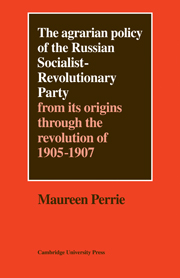 The Agrarian Policy of the Russian Socialist-Revolutionary Party
The Agrarian Policy of the Russian Socialist-Revolutionary Party Book contents
- Frontmatter
- Contents
- Preface
- Acknowledgements
- Note on dates and transliteration
- Map of regions and guberniyas of European Russia
- Introduction
- Part I From Populism to the SR party (1881–1901)
- Part II The campaign for the peasantry (1902–1904)
- Part III The revolution of 1905
- Part IV The aftermath of revolution (1906–1908)
- 12 The party approves its programme
- 13 Splits in the party
- 14 The SR agrarian programme in the first two Dumas
- 15 The commune, socialisation, and the Stolypin reforms
- 16 Party activity in the countryside
- Conclusion
- Glossary
- Bibliography
- Index
14 - The SR agrarian programme in the first two Dumas
Published online by Cambridge University Press: 07 October 2011
- Frontmatter
- Contents
- Preface
- Acknowledgements
- Note on dates and transliteration
- Map of regions and guberniyas of European Russia
- Introduction
- Part I From Populism to the SR party (1881–1901)
- Part II The campaign for the peasantry (1902–1904)
- Part III The revolution of 1905
- Part IV The aftermath of revolution (1906–1908)
- 12 The party approves its programme
- 13 Splits in the party
- 14 The SR agrarian programme in the first two Dumas
- 15 The commune, socialisation, and the Stolypin reforms
- 16 Party activity in the countryside
- Conclusion
- Glossary
- Bibliography
- Index
Summary
One of the first issues tackled by the First SR Congress, in view of its immediate tactical significance, was the party's attitude towards the State Duma, which was to be convened in the spring of 1906. Only one delegate, ‘Norring’, from Riga, spoke in favour of participation in the Duma, with the aim of using it as a tribunal for revolutionary propaganda. Opinions were divided on whether the party should boycott the elections in their entirety, or participate in the preelection meetings in order to campaign there against the Duma and in favour of a Constituent Assembly. Although Chernov himself advocated the latter course, his amendment was for once defeated, by 28 votes to 20, and the congress resolved to boycott both the Duma itself and the pre-election meetings.
The results of the elections to the Duma, which were held in March and April 1906, showed how mistaken the boycott policy of the revolutionary parties was. The overwhelming majority of the peasants ignored the boycott appeals and, placing great hopes in the Duma as a means of obtaining land reform, elected their own representatives, mainly non-party men with radical sympathies, to champion their cause. In the Duma, these ‘leftist’ peasant deputies formed a parliamentary fraction calling itself the ‘Labour group’ (Trudovaya gruppa) or Trudoviki Politically, the Trudoviki were to the left of the Kadets. The majority held views similar to those expressed at the congresses of the All-Russia Peasant Union, and some sympathised with or shared the programmes of the SRs and SDs.
- Type
- Chapter
- Information
- The Agrarian Policy of the Russian Socialist-Revolutionary PartyFrom its Origins through the Revolution of 1905–1907, pp. 168 - 176Publisher: Cambridge University PressPrint publication year: 1977
